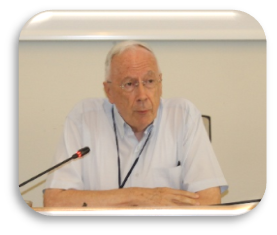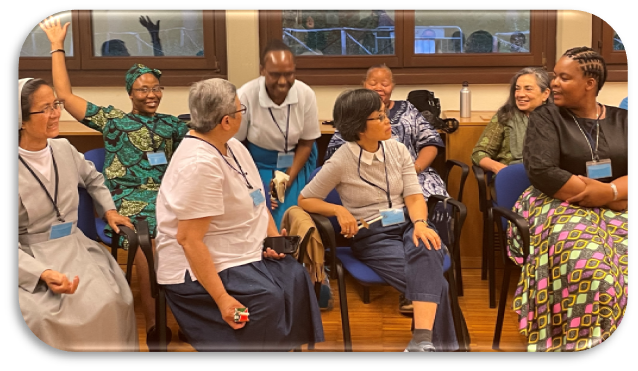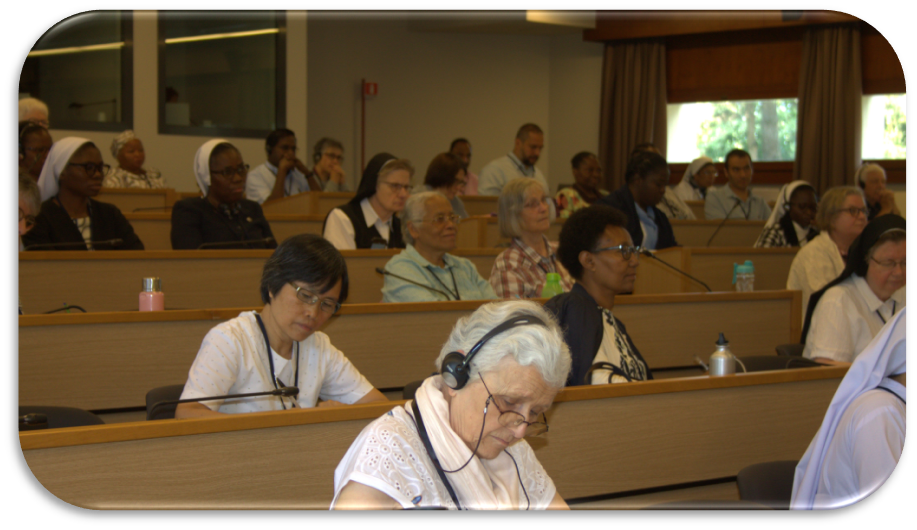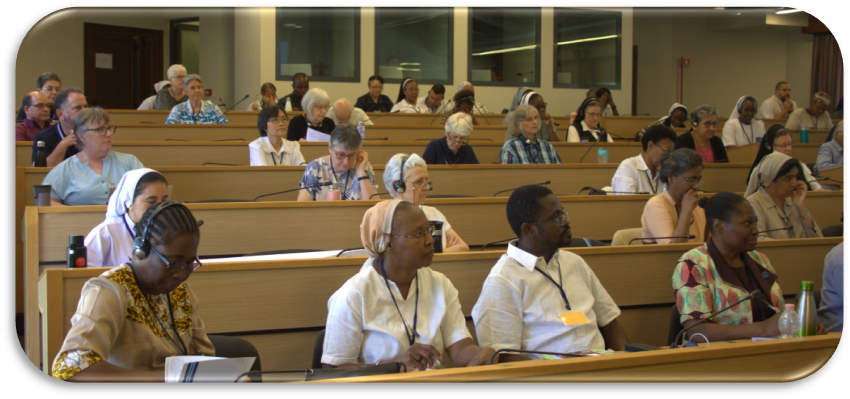Charism, Prophecy and Witness in a Synodal Journey
René Stockman, FC

During the 5 days that we were together, we were walking humbly with God, with God who sent us his Holy Spirit as our real and only guide, and through and with God we were walking with each other. We found and received inspiration for it through our daily Lectio Divina, in our prayer, where we opened our heart for the voice of the Holy Spirit, the voice that we also could hear in listening attentively to each other. We can now ask ourselves now: are we ready to continue this way of walking together, this way of synodality, also after these 5 days, and continue our walk with our brothers and sisters in our communities, with the men and women with whom we are collaborating, with our brothers and sisters we are serving, with other groups in the Church and with the whole people of God? Or do we prefer to close ourselves, to walk alone and find ourselves self-sufficient, to build again walls and focus on our hierarchical structures, where the one is higher and the other lower, where our clerical mentality creates only distances. Indeed, we maintain free to choose how to walk: alone or with others, but we have to ask ourselves if we are in fact really fully free to do that, when we see and experience ourselves as real brothers and sisters of each other and believe that this is Gods real nature that is planted in our hearts. Or to mention here the philosopher Emmanuel Levinas: it is the face of the other that put us towards an ethical imperative: our being a person in relation with other prevails our absolute freedom. We can never ignore the fact that we are all brothers and sisters, with responsibility for each other, and it is in the face of the one we meet that we hear the call to be respected, to be helped, to be loved. Closing us for that is ignoring our real identity as a human being. It is repeating what Cain was saying on the request of God where his brother Abel was: “I am not responsible for my brother, I am not my brother’s keeper”.
Walking together is developing real hospitality to the other, where the door is open to receive the other and through which we can leave our comfort zones in order to go to the other, where the table is ready to serve the food and the drinks and where we are ready to dance and sing with each other, like we did with joy the night before. For Henry Nouwen hospitality was all about that: to create a free space where the other could be himself of herself, where the other is appreciated for his or her presence, where the other can sing his or her own song, feel free to stay or to leave and to greet each other in their own language, like we also did the night before.

Today, in our walking together, we speak a lot about interculturality. Is that something new and were the first missionaries who proceeded us not open for the culture of the other, yes, the very strange culture in which they arrived? They were learning the language, they were listening to their stories, they were singing together their songs and dancing their dances. But perhaps it was not always with a full mentality of equality, and even today, this feeling of superiority and inferiority didn’t totally disappear, also between the different tribes and ethnical groups who are forming community. I read in our own history how difficult the first local brothers had to live in harmony with the missionaries coming from the North who were before their teachers they appreciated but who had now difficulties to see their former students as real brothers, and how difficult it was and still can be to live peacefully and in harmony with those from another ethnical background. Interculturality maintains a challenge, especially in our time where our communities are becoming more and more international, and where the only common culture that can overcome all differences is: the culture of the Gospel. In discussions about our different cultures, our different backgrounds, our different customs and lifestyles, and its tensions that can bring in our communities, the question must always be: is this expression of culture in line or in opposite with the values of the Gospel, are we expressing our real and pure Christian faith through and with this behaviour or is it in opposite with it or is it only an emotional reaction that we develop, that finds its origin in our feeling of superiority?

Interculturality will always maintain a learning process, and therefore it is so healthy that already in the early stages of formation, we all learn how to live in harmony with each other and that we can learn how to walk humbly with God and so also humbly with each other. It is an essential point to develop if we will grow as persons and as groups in that attitude of synodality, where we learn a new culture of active listening to each other, where we learn to discern with each other, where we gradually develop real reciprocity towards each other. These are basic attitudes that cannot only be taught in a theoretical way, but have to be learned through experience, by living it. Can we dream of our communities, our congregations and societies where openness towards each other may grow, where mutual trust and honesty are present and where those who are wounded can find consolation and real healing. We were happy to learn during these days that many of us have good experiences in this living together with different cultures and developed, to use the word that was given by Cardinal Tagle, a kind of cultural intelligence. We are really thankful for their witnesses about it.
At the basic of our lives, at the basic of our religious communities, is the Holy Spirit present with his charisms, and every one of us received his own specific charism and found also his or her home in the charism that was given by the Holy Spirit to the religious group that he or she joined. Let us be thankful and joyful living our charisms as a real gift to the world and in the Church. It is like a rich field with many different flowers which give colour to our world, to our society, in our Church, and that forms a wonderful harmony. It is so important to know our charism which is at the basic of our identity, to live our charism as one specific part of the message of the Gospel through which we may contribute to bring the Kingdom of God in the world. That is our missionary vocation and mission, and everyone is invited, like Francis of Sales said and Teresa of Lisieux with him that as different flowers we all have the flourish in our way and on our place. But perhaps we have now to add that we have to flourish together, be thankful for the many other flowers that are flourishing also in the field of our world and with which we are forming a rich and colourful mosaic.
In our charism is something stable and at the same time dynamic. We remember the famous words from Vatican II where religious were invited to go back to their roots, to their founder and their own initial stories in order to discover again their charism, because in some cases it was somewhat forgotten, but at the same time to develop a real aggiornamento, a dynamic translating of the original charism in terms and actions for today, linked to the real needs, to the new needs, listening to the cry of God in the cries of his people. Everyone is invited to shine Gods love in the world, especially in the world of those who have no experience that God is loving them, those who are marginalized, those who are living at the periphery of our existence. Every group of us will have here his specific way to give form to this vocation and mission. But we can only shine Gods love in the world if Gods love is present in our hearts, if our charism is a living reality in our personal lives and in the lives of our communities. We can only see, meet and love Jesus in the other, recognize Him in the face of the other, of the poor, of the sick, when we already know Him through our prayer life. Therefore, as consecrated men and women, we have always to be contemplative, if we will be really apostolic, if we will live our being a missionary to the full. We remember here Mother Tereza who answered on the question if her sisters were contemplative or apostolic with a simple “yes”, explaining afterwards that nobody could be really apostolic without being contemplative. I think that is true for all of us.
But it should be a mistake to think that only we as so-called consecrated men and women received the gift of the Holy Spirit. Therefore, it is really urgent to become aware of the charisms living in an active way in other Christians, in men and women with whom we are working together, and therefore find new ways of collaboration, and even more than collaboration, coming to real reciprocal exchanges, walking and travelling together, ready to learn from each other, sharing our mutual charism so to enrich each other, our communities, our world and those we are serving. No gift of the Holy Spirit is given to be kept in an anxious way for ourselves alone, but is given to be shared with many, really without limits. And these gifts are also given to us through the one we are serving, we must have the humility to let us educate by them and discover through our encounters with them new elements in our charisms. Some months ago, I was in Rwanda visiting one of our centres for children with a physical disability, where I met a small boy whose both legs were amputated and was now learning to walk with protheses. And the only word he spoke with a big smile was: “Dieu merci”. Here I heard the Holy Spirit who enriched my charism of charity through these words of that small boy, who continued in his suffering and fragility to thank God. Yes, the Holy Spirit is always new, it is always Pentecost that is going on, and the Holy Spirit brings us together, let us understand each other, help us to form real communities. And so we come to the point that we are urged to walk together, with different speeds, adapting our own speed to the one of the other, so that we can really walk together, hand in hand.
It is through living our charism in a radical way and open towards the many charisms that are alive in others, that we become real prophets in the world of today. Because consecrated life is by nature prophetic, but so many times we are living beyond our mission because we are afraid to leave our comfort zones. It has to start in our own lives and in our own communities. It is there that we have to live our religious consecration and our vows with joy and shine this joy towards others. Our way of life is not an evidence in the eyes of many today, but it had to be a point of reflection about what is really important in life, in a world where people are losing their eschatological view. Our lives have to be a silent sign of God’s presence in the world and the fact that the world and life in it is not closed on itself, but finds its origin and destination in God, what brings us the real joy in life. We have to keep our enthusiasm and our hope also and especially in difficult moments, also when our groups are diminishing and becoming old. To be a prophet is not only through great acts and strong words, but finds its origin in our way of life, in our way of being present in the life of others, in the way we can show the compassion of God to those who are suffering. It is starting with developing small sign of goodness towards others, and set a block on every kind of indifference.

A prophet is seeing and interpreting the reality of life with and through the eyes of God. And through our presence, through our concrete love for the other, we will bring God alive and present in the world. There are today different new ways to bring God in the world and that asks creativity, courage and especially trust that God will never abandon us, that we hear his words sounding again: “Don’t be afraid”.
Prophecy is also about struggling against unjust structures, situations where people are discriminated, not respected in their human dignity. On this level, it is so important to work together with other groups, with other congregations, to find our place also in official organisations where we have to let hear our voice in defending the poor, the neglected, the voiceless. These groups with our active presence can really be sings of prophecy and awake politicians and governments in order to take their responsibility in the field of developing justice and peace. We all know that this can be also very delicate, even dangerous, especially in regimes where the human rights are not respected. We remember the stories of those who took serious risks, even with the danger to lose their lives. Let us not forget those modern martyrs in our religious families and let us find inspiration in their lives and in the gift of their lives for the wellbeing of others. “Nobody can have greater love than to give his life for his friends”. Last Sunday we celebrated the beatification of Floribert Bwana Chui who was killed in Goma in RDC, because he was more concerned about the health of the people than to accept corruption through which the life of people should come in danger. He is a strong example for our actual world, especially in those places where corruption became part of the system and where also we as missionaries are confronted with and can even be tempted to lose our indignation for situations where injustice is becoming the norm. Here also can being together as missionaries, with our colleagues in the field, in a synodal way be a great support in our common struggle against unjust structures, through which finally always the poor and the weak are the first victims.
Missionary Institutes and synodality: charism, prophecy and witness. We can only give a positive witness as missionaries if we are ready to put down all walls of self-sufficiency, of clericalism, of superiority, and out of a clear knowledge of our identity recognize our strengths and weaknesses, accept our limits and see the necessity of working together with others in a positive way. God is showing us through our weaknesses, through our vulnerability, which we have not to ignore or try to escape, new ways of collaboration, the importance of networking, the way that we have to give a full place to the laity in our collaborations with them in pastoral activities and in the management of our apostolic works. Not with fear, not with suspicions, but with fully recognition of our and their identity and finding in our shared charism the real source for a healthy reciprocal exchange and collaboration. Let us also here learn from each other where synodal walking together gave already many fruits.
Thank you, dear Brothers and Sisters, for your openness, for your synodal walking during these days of grace, and let us pray for the blessing of the Lord and the intercession of his divine Mother and inspired by our beloved Founders to continue our walking with courage, with great joy and that together, in a synodal way.